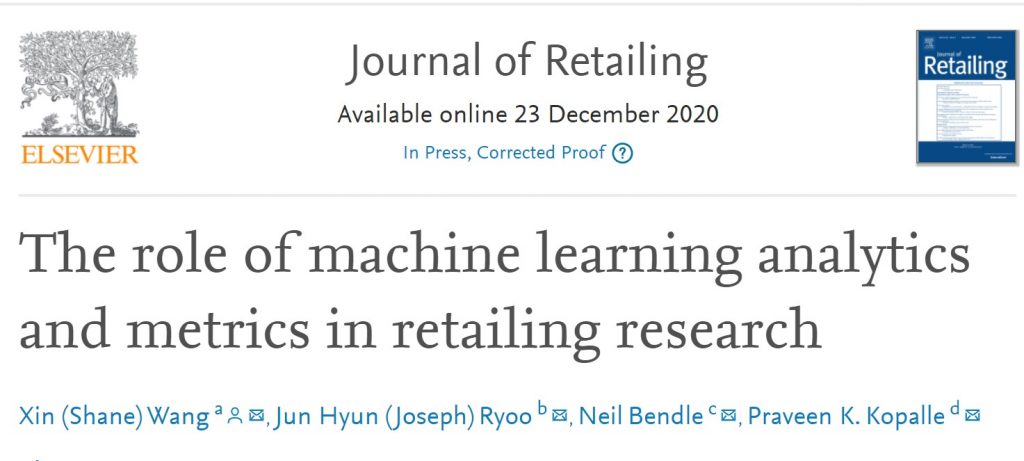Joseph Ryoo, Xin/Shane Wang, Praveen Kopalle and I have an article available now in the Journal of Retailing. This focuses on machine learning and retailing. It is a major question how new technology will change retail. Our work therefore tries to get a grip on this.
Reviewing Machine Learning And Retailing In The Literature
We were hoping to help give some insight to the field. As such we first discuss what is machine learning and how this differs from artificial intelligence. We provide a review of the current state of machine learning in top-level retailing and marketing research. If you are interested in the topic this is a great place to start to get an idea of the prior research.
The paper then gives suggestions for future research and showcases potential applications for practitioners.

Explanatory And ML Approaches
We show where ML methods are particularly useful. To do this we discuss areas of divergence between the traditional explanatory approach to data analysis and ML inspired methods.
By an explanatory approach we mean an approach that seeks to isolate single variables to test hypothesis. “Does lowering the price by $1 increase sales?” ML approaches are often more practically useful. Why? They don’t try to get the single variable alone. This is realistic because single variables never appear alone in practice. A box of cereal, for instance, must have a box and some cereal and be sold by some retailer. It can’t just have a single price variable.
ML approaches will give advice, for example, on a package of variables in an offer. The downside is that you won’t necessarily know the precise impact of price versus color verus size etc…As such, we suggest that the explanatory and machine learning approaches need not be mutually exclusive. They are both useful. It largely depends which you need upon what you are trying to do.
Bringing Managers And Academic Closer Together
In an ideal world the use of ML might even bring academics closer to managers. Maybe we were just being positive but why not? Given this we say:
Academic research has often been seen as more important if it posits a near universal causal connection. Boundary conditions are specified, but researchers’ incentives are to downplay the caveats to appear more widely relevant. ML generates weaker assertions about underpinning relationships. If research posits fewer theories of universal relationships, marketing academics, especially editors and reviewers, may need to embrace more modest, context dependent findings. This can be positive, as more modest assertions, while retaining sophistication not always present in advice from consultants, can be more persuasive to managers than sweeping statements.
Wang, Ryoo, Bendle and Kopalle (2020)
ML clearly has a great role in retail going forward. Let us hope our positive thoughts are right. If we are right it can help bring academics closer to managers.
For more on machine learning see here and here.
Read: Xin Shane Wang, Jun Hyun(Joseph) Ryoo, Neil Bendle, and Praveen K. Kopalle. “The role of machine learning analytics and metrics in retailing research.” Journal of Retailing (2020).
